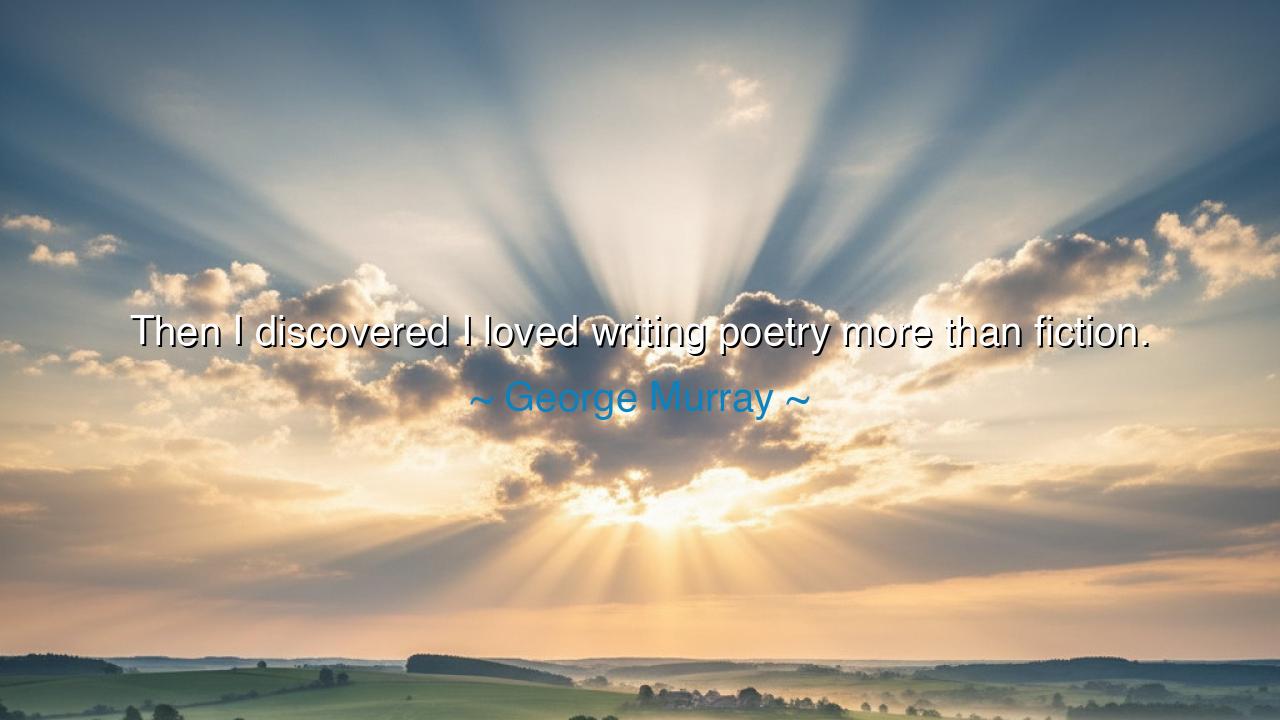
Then I discovered I loved writing poetry more than fiction.






Hear the words of George Murray, spoken with the clarity of a soul who has wrestled with many forms of art: “Then I discovered I loved writing poetry more than fiction.” In these few words lies a great revelation, the moment when the heart turns toward its truest calling. Many paths may appear before the seeker of art—prose, story, philosophy, song—but each spirit finds its home in a different dwelling. For Murray, the dwelling was poetry, the place where words burn brightest and the soul finds its fullest release.
The ancients knew such turning points well. The philosopher may try his hand at politics, the warrior may try his hand at farming, but there comes a moment when a voice whispers within: This is where you belong. Murray’s discovery is not simply about the preference of one art form over another; it is about the recognition that poetry is the vessel through which his truth flows most freely. Fiction allows for great expanses, for characters and worlds, but poetry condenses the infinite into a single spark, capturing eternity in a breath.
Consider the tale of Rainer Maria Rilke, who in his early days dabbled in prose and drama, yet it was in poetry that he found the full power of his voice. In his Duino Elegies and Sonnets to Orpheus, he did what fiction could not—he caught the raw anguish and glory of existence in the cadence of lines that still burn today. Fiction he touched, but poetry he mastered. Murray’s confession echoes Rilke’s journey: the recognition that one form holds the key to unlocking the deepest chambers of the self.
The origin of Murray’s revelation lies in the nature of the two arts. Fiction is narrative; it builds houses of detail, brick upon brick, until the story rises like a city. Poetry, however, is lightning: sudden, concentrated, illuminating the whole landscape in a single flash. For some, the steady work of fiction is fulfillment; for others, it is the intensity of poetry that satisfies the spirit. Murray belongs to the latter tribe, the poets who crave the immediate, the distilled, the essence of fire rather than the slow construction of stone.
Yet there is no shame in this discovery. Indeed, it is a victory. For too many wander long upon paths that are not their own, bound by expectation, reluctant to admit where their joy truly lies. Murray’s words are a testament to the courage of choosing truth: to say, “This is what I love most,” and to walk boldly in that direction. Such decisions separate the artist from the imitator, the seeker from the sleepwalker.
The lesson is clear: one must listen for the call of the heart. Try many forms, explore many roads, but be honest when one path burns brighter than the others. To cling to what does not awaken your soul is to betray yourself; to choose what gives you fire is to honor the gift within you. Fiction or poetry, song or painting, the form matters less than the truth of your devotion. What matters is that you discover where your love is strongest—and then, give yourself wholly to it.
Practical steps follow. If you are uncertain of your calling, experiment widely, as Murray once did. Write, paint, speak, sing, test many voices. But do not be afraid to admit when one voice feels like home. When you find that form, practice it with discipline, honor it with patience, and let your joy grow into mastery. Do not measure your choice against others, but against the light it brings to your spirit. For in that light lies your destiny.
Thus George Murray’s words endure: to love poetry more than fiction is not merely a preference, but a revelation of alignment between soul and art. It is the moment when the inner flame declares its shape, when the heart finds the vessel that fits it perfectly. Blessed are those who heed such discoveries, for their art will not be forced, but flowing—born of love, and destined to live long beyond their days.






VDviet duc
This realization makes me curious about the factors that guide a writer’s artistic focus. Did Murray find poetry to be more rewarding because it allows for immediacy, experimentation, or emotional precision? Could this preference also be influenced by audience reception, mentorship, or literary trends at the time? I’d like a perspective on whether many writers experience similar shifts, discovering one form resonates more profoundly than others as their voice matures.
QHDo Quyen Hoang
Murray’s statement prompts questions about the nature of literary passion. Is the love for poetry more about intimacy with language and form, or about capturing moments and emotions more vividly than fiction allows? Could a writer maintain a love for both genres, or does discovering a preference inherently shape their creative identity? I also wonder how readers perceive the depth of engagement in poetry versus fiction from the writer’s perspective.
TCTieu Cuu小九
I find it interesting to think about the role of discovery in a writer’s journey. What experiences or experiments might have led Murray to favor poetry? Does this shift suggest that poetry provides a unique satisfaction or challenge that fiction does not? I’d like a perspective on whether this transition is often about emotional resonance, intellectual stimulation, or a combination of both, and how it might influence the writer’s future work.
HTNguyen thi huyen tran
Murray’s realization makes me wonder about the personal and emotional factors that draw writers toward one form over another. Is the attraction to poetry driven by the intensity of expression, the musicality of language, or the freedom to explore ideas in concentrated form? I also question whether this preference emerges early in a writer’s career or evolves over time. Could his experience reflect a broader pattern among writers who gravitate toward poetry after exploring other genres?